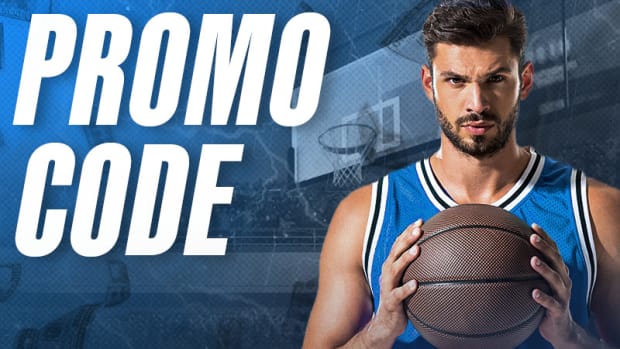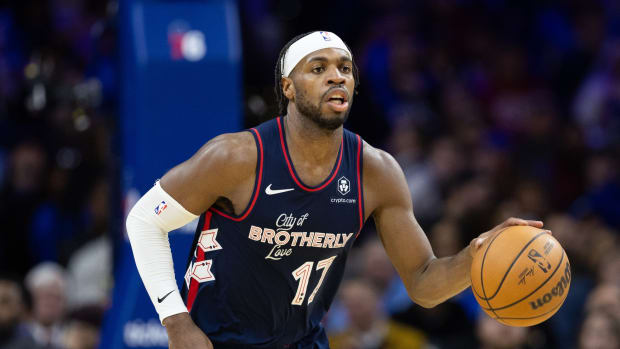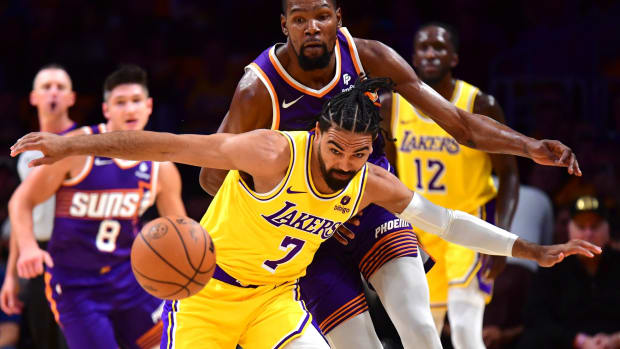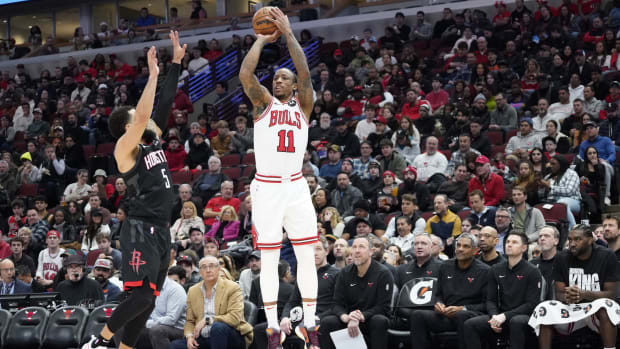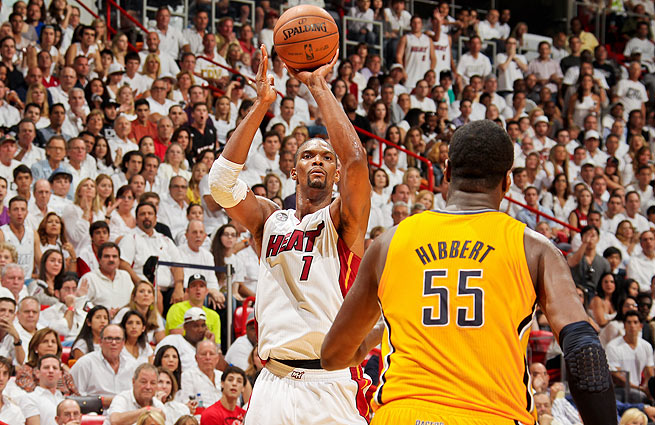
In shedding ego, Bosh has become Miami's most important player
INDIANAPOLIS -- "I always thought about being The Man," said Chris Bosh, who then invoked a name greater than his alpha-and-omega teammate. "I always wanted to be Jordan. That's what I wanted to be."
The stats say Bosh is not and never will be Jordan -- or LeBron James either. In these playoffs Bosh is averaging 14 points and 7.1 rebounds for Miami. Of far greater importance to Bosh are the championship he helped win last season and the 10 playoff games he has helped the Heat win this season -- and the six more wins they'll need over the weeks ahead.
The funny thing about winning in the NBA is that no one ever seems to understand what it will take until the job is done. Jordan needed seven years to find out. LeBron James learned over a span of nine years. Bosh is playing against a center now, in Indiana's 280-pound Roy Hibbert, who is just beginning to understand how to serve the larger needs of his team.
THOMSEN: Miami establishes terms, grabs 2-1 lead
It made Bosh laugh to think about how he's now having to see the game from Hibbert's point of view. Bosh at 6-foot-11 never wanted to be a center, but here he is in the Eastern finals, three inches shorter and 45 pounds lighter than his assignment.
"One thing I've learned since I've been here is what you really have to sacrifice in order to be on a winning team," said Bosh. "A case in point is guarding Roy Hibbert. If I had my choice, I [wouldn't] want to wrestle with that guy for a whole game. Him and David West? Well, David West I probably have to -- but not Roy Hibbert. But I'm going to have to come in, do my job, do it well in order for us to win."
A steady criticism of Bosh inside and outside the NBA is that he isn't a star on the level of James and Dwyane Wade. But consider the other point of view for Bosh, who averaged in excess of 22 points per game over his final five years with Toronto: If he were intent on proving his stardom, would Miami be on course to win a second championship? The answer, insists coach Erik Spoelstra, is no.
"That's why for three years we've said he's our most important player," said Spoelstra. "Because he had been a proven No. 1 option that had the maturity and ego to be able to accept a totally different role, and a role that was initially uncomfortable for him. We'd put him in so many different places where he hadn't played before. But it took him to be able to accept and adapt to all of that for us to truly unlock our versatility."
Pacers broadcaster rips Heat fans for leaving Game 2
After being raised as a young star in an American basketball culture that teaches players to view themselves in terms of their stats, Bosh at 29 has learned to see success from a new perspective. "I had to reprogram myself," he admitted. "You have to submerge yourself in the team, and sometimes it's doing things you don't want to do. It's whatever the team needs, and usually you have to listen to your coach to know what the team needs. You can't be like, well, this is what I'm going to do to help this team. It doesn't work like that."
Actually, it happens that way all the time on other NBA teams. Those teams aren't playing right now, because that self-serving approach doesn't win in the playoffs. "He still looks at the stat sheet, but he looks at the things that are more poignant to his game -- the efficiency, the stats that he knows directly impact winning and losing," said Shane Battier. "How many defensive rebounds did the other team have? It's not just the points, the steals, the assists, the rebounds that most look to at the end of the game.
"It takes a certain type of strength and character and belief in yourself to play the role he plays. Most guys wouldn't; most guys under 30 wouldn't. So he's a unique individual in this league."
When Bosh arrived in Miami and the Heat were seeking their identity for the better part of two seasons before they won the championship, it was easy to criticize him as a weak link. He wasn't a traditional big man, he wasn't bullying opponents in the post and he wasn't establishing a physical tone for his new team.
What was telling, however, was Miami's decision to embrace his strengths. Instead of pushing Bosh to play down low, Spoelstra and his coaches went the other way, encouraging Bosh to become more of a perimeter player. This season he averaged a career-high of one three-point attempt per game, and that number has doubled in the playoffs. In total, Bosh has made 11 of his 24 threes (45.8 percent) so far in the postseason, which has increased the pressure on opponents.
The Heat have been most effective in this series with their smaller lineup in which Bosh is the center on the perimeter. And yet the Heat have still been able to generate offensive rebounds and second chances against the larger Pacers. "One of the most unique attacks that I've ever witnessed, when you count how many times there's five offensive players on the court and not one of them is inside the three?point line," said Pacers coach Frank Vogel. "That doesn't mean they're going to say, 'We're not going to crash.' They're all crashing from the three?point line. That's a unique challenge in terms of your box?out assignments, where you don't know which of those five guys is coming. Are they coming from the corner? Are they coming from the top of the key? They're coming from everywhere."
Bosh's rebounding numbers aren't impressive (he's averaging just 3.3. per game in the Eastern finals), but Spoelstra says he and Battier rate highly in terms of box-outs and preventing their opponents from rebounding. The importance of Bosh became obvious when he was injured in Game 1 of the conference semifinals against Indiana one year ago. "When Chris went out our first year [2010-11] for two weeks, that's when everybody realized how important he was for us," said Spoelstra. "And that's why last year, when he went out the first game of Indiana, our first initial reaction -- everybody, collectively -- was like, 'We're in trouble.' Because he had that much of an effect on our team."
It was no exaggeration. They survived the series against the Pacers, but they probably would not have beaten the Celtics if Bosh had not returned in time.
"Look, Chris has an ego. He does. You don't become a star in this league without an ego," said Spoelstra. "But he knows how to manage his ego and mold it into a team ego, and he understands that winning is the only thing that matters. He understands that conceptually as well as anybody I've ever been around, and he wants to be part of winning, and he'll do whatever it takes to win. If that's sacrificing and adapting his role, he's absolutely 100 percent for it, and that's very refreshing in this league."
James is unselfish with the ball. Wade stepped aside to surrender leadership to LeBron. Bosh took on a more nuanced role in order to bring out the best in Dwyane and LeBron. Ray Allen comes off the bench in support of Chris, Dwyane and LeBron, and Battier defends a variety of positions in order to liberate them, and on and on it goes.
It was a new way of playing for most of them. Bosh could not be sure their best efforts would be rewarded. Ask him when he believed he had turned the corner on his team-first perspective, and he will start laughing. "When we won last year," he will admit. "You never know."
In fact, he does know. He knows now.































